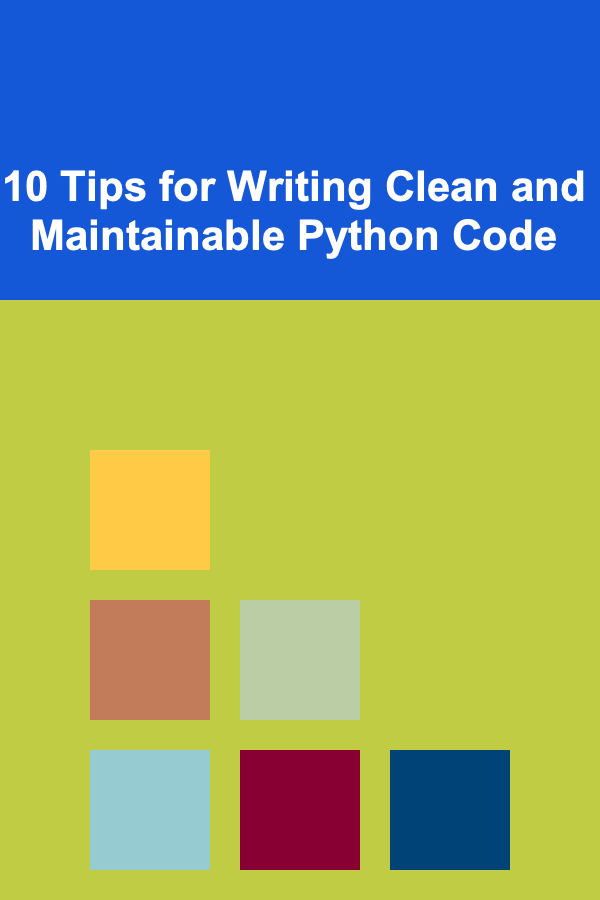
10 Tips for Writing Clean and Maintainable Python Code
ebook include PDF & Audio bundle (Micro Guide)
$12.99$9.99
Limited Time Offer! Order within the next:

Writing clean and maintainable code is essential for developers who want to ensure that their projects are easy to understand, scale, and update in the future. Python, with its elegant syntax and vast ecosystem, allows for quick development and prototyping. However, as projects grow, it's easy to fall into bad practices that can hinder the maintainability of the codebase. This article presents 10 essential tips that every Python developer should follow to write clean and maintainable code.
Use Meaningful and Descriptive Names
Choosing clear and descriptive names for variables, functions, classes, and modules is one of the most important practices for writing clean Python code. It helps both you and your collaborators quickly understand what a piece of code does.
Why It's Important
- Readability: Descriptive names make it easy to understand the purpose of variables and functions without needing to examine the entire code.
- Maintainability: Clear names ensure that when you return to your code after some time, you'll quickly recall its purpose.
Best Practices
- Use descriptive variable names : For instance, instead of naming a variable
x, useitem_countoruser_age. - Use verbs for function names**: A function name should clearly describe the action it performs. For example, use
calculate_total_price()instead of justtotal_price(). - Use CamelCase for class names and snake_case for function and variable names, as per PEP 8 guidelines.
def calculate_discounted_price(self, price):
return price * 0.9 # Applying a 10% discount
Follow the PEP 8 Style Guide
PEP 8 is the official style guide for Python, outlining conventions for writing readable, consistent code. Adhering to this guide ensures that your code is easily understandable to other Python developers.
Key PEP 8 Guidelines:
- Indentation: Use 4 spaces for indentation, not tabs.
- Line Length: Limit all lines to 79 characters to ensure that code is readable in multiple environments.
- Blank Lines: Use blank lines to separate functions and classes, and to separate sections of code inside functions.
- Imports: Imports should be on separate lines. Avoid importing everything using a wildcard.
Example:
import sys
def my_function():
pass
Write Modular Code
Breaking your code into smaller, reusable functions and classes is essential for maintainability. Functions should do one thing and do it well. Small functions are easier to test, debug, and update.
Why It's Important
- Reusability: Smaller functions can be reused in multiple places, reducing code duplication.
- Testability: Small functions are easier to test and debug individually.
- Readability: Breaking down large chunks of code into smaller units makes it more digestible.
Example:
# Fetches user data from the database
pass
def process_user_data(data):
# Processes the user data
pass
Document Your Code
Good documentation helps others (and yourself) understand your code quickly. Proper comments and docstrings explain what each part of the code is doing and why certain decisions were made.
Why It's Important
- Clarity: Comments and docstrings clarify the purpose of the code, making it easier to understand.
- Long-Term Maintenance: When revisiting code after some time, comments help refresh your memory and explain why a particular approach was used.
Best Practices
- Use docstrings for all public classes and functions. A docstring should describe the purpose, parameters, and return values of a function.
- Use inline comments for explaining complex or non-obvious parts of the code.
"""
Calculate the area of a circle.
Parameters:
radius (float): The radius of the circle.
Returns:
float: The area of the circle.
"""
return 3.14159 * radius ** 2
Handle Errors Gracefully
Error handling is crucial for writing robust Python code. Use try and except blocks to manage exceptions, ensuring that your program can handle unexpected situations without crashing.
Why It's Important
- Reliability: Proper error handling ensures that your program can recover from errors and continue running or provide meaningful feedback to users.
- Debugging: Clear error messages make it easier to debug issues when they arise.
Best Practices
- Catch specific exceptions rather than using a broad
exceptstatement. - Provide meaningful error messages that help users or developers understand what went wrong.
user_data = get_user_data(user_id)
except KeyError:
print("Error: User data not found.")
Keep Functions and Methods Small
Functions should ideally be small and focused on one task. Long functions are harder to understand, test, and maintain. Keeping functions small also encourages better abstraction and easier debugging.
Why It's Important
- Simplicity: Small functions are easier to comprehend and reason about.
- Separation of Concerns: Keeping functions focused on one task helps achieve better code organization.
Best Practices
- If a function is getting too long, consider breaking it into multiple smaller functions.
cleaned_data = clean_data(data)
analyzed_data = analyze_data(cleaned_data)
return analyzed_data
Write Unit Tests
Writing unit tests is crucial for ensuring that your code works as expected. Tests allow you to catch bugs early and ensure that changes made to the codebase don't break existing functionality.
Why It's Important
- Regression Prevention: Unit tests ensure that changes or new features don't unintentionally break existing functionality.
- Confidence: Tests provide confidence that your code performs correctly, even after updates.
Best Practices
- Use Python's built-in
unittestorpytestframework for writing tests. - Aim for 100% test coverage to ensure that all parts of the code are tested.
class TestCalculateArea(unittest.TestCase):
def test_calculate_area(self):
self.assertEqual(calculate_area(2), 12.56636)
if __name__ == '__main__':
unittest.main()
Avoid Global Variables
Global variables make your code harder to understand and maintain, as they can be modified from anywhere in the program. They also make testing more difficult.
Why It's Important
- Encapsulation: Global variables break the encapsulation of functions and classes, making it harder to track state.
- Unpredictability: Changes to global variables can introduce bugs that are difficult to track.
Best Practices
- Minimize the use of global variables and prefer passing parameters to functions or using class attributes.
Use List Comprehensions and Generators for Efficiency
Python's list comprehensions and generators are more concise and efficient than traditional for-loops. They also make your code cleaner and more readable.
Why It's Important
- Performance: List comprehensions and generators can be more memory-efficient than loops, especially when working with large datasets.
- Clarity: They make your code more compact, readable, and Pythonic.
Example:
squared_numbers = [x ** 2 for x in range(10)]
# Generator expression
squared_numbers = (x ** 2 for x in range(10))
Avoid Code Duplication
Duplication of code leads to maintenance headaches, as changes need to be applied to multiple places. Instead, abstract common functionality into reusable functions or methods.
Why It's Important
- Maintainability: When the same code is repeated in multiple places, maintaining it becomes cumbersome and error-prone.
- Refactoring: Consolidating similar code into reusable functions makes it easier to refactor.
Best Practices
- Refactor duplicated code into functions or methods that can be reused.
# Common functionality for fetching data
pass
def get_user_data(user_id):
query = f"SELECT * FROM users WHERE id = {user_id}"
return fetch_data_from_database(query)
Conclusion
Writing clean and maintainable Python code requires discipline, but the benefits are immense. By following these 10 tips---using meaningful names, adhering to PEP 8, writing modular code, documenting thoroughly, handling errors gracefully, and more---you ensure that your code remains readable, reliable, and easy to update. Ultimately, clean code leads to better software, improved collaboration, and less time spent on debugging and maintenance.
By adopting these best practices, you set yourself up for long-term success in Python programming and beyond.
Reading More From Our Other Websites
- [Tie-Dyeing Tip 101] From Sketch to Fabric: Designing Custom Spiral Tie-Dye Patterns
- [Home Soundproofing 101] How to Soundproof a Room for Better Audio Clarity
- [Personal Care Tips 101] How to Start Low-Impact Cardio for Joint Health
- [Home Renovating 101] How to Create Built-in Storage Solutions to Maximize Your Home's Space
- [Personal Finance Management 101] How to Navigate Financial Planning for Families: From College Savings to Retirement
- [Organization Tip 101] How to Create a Wedding Day Packing List
- [Personal Finance Management 101] How to Prepare Your Finances for a Big Life Change
- [Personal Financial Planning 101] How to Create a Comprehensive Retirement Plan: A Step-by-Step Guide
- [Home Lighting 101] How to Set Up a Smart Home Lighting System for Energy Efficiency
- [Personal Investment 101] What is a Fiduciary Financial Advisor and Why You Should Work with One

Client First: Essential Skills for Effective Client Relations Management
Read More
How to Collect and Use Customer Feedback: A Checklist for Continuous Improvement
Read More
The Executive Assistant's Playbook: Managing High-Level Tasks with Precision
Read More
How to Understand Wine Grapes and Their Characteristics
Read More
How To Sketch Architectural Details: A Comprehensive Guide
Read More
How to Learn About Superconducting Quantum Computers: A Comprehensive Guide
Read MoreOther Products

Client First: Essential Skills for Effective Client Relations Management
Read More
How to Collect and Use Customer Feedback: A Checklist for Continuous Improvement
Read More
The Executive Assistant's Playbook: Managing High-Level Tasks with Precision
Read More
How to Understand Wine Grapes and Their Characteristics
Read More
How To Sketch Architectural Details: A Comprehensive Guide
Read More